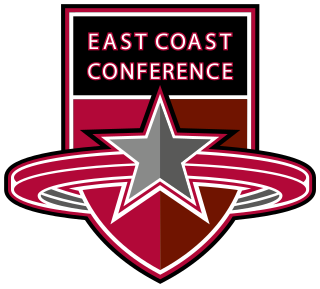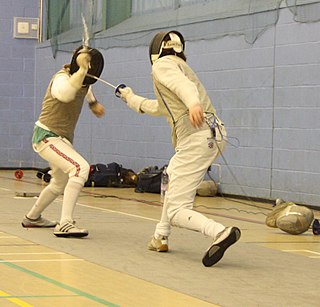
The Northeast Conference (NEC) is a collegiate athletic conference whose schools are members of the National Collegiate Athletic Association (NCAA). Teams in the NEC compete in Division I for all sports; football competes in the Division I Football Championship Subdivision (FCS). Participating schools are located principally in the Northeastern United States, from which the conference derives its name.

The Harvard Crimson is the nickname of the intercollegiate athletic teams of Harvard College. The school's teams compete in NCAA Division I. As of 2013, there were 42 Division I intercollegiate varsity sports teams for women and men at Harvard, more than at any other NCAA Division I college in the country. Like the other Ivy League colleges, Harvard does not offer athletic scholarships.

The Mountain Pacific Sports Federation (MPSF) is a college athletic conference with members located mostly in the Western United States, although it has added members as far east as Pennsylvania. The conference participates at the NCAA Division I level, primarily in Olympic sports that are not sponsored by a school's primary conference.

NCAA Division I (D-I) is the highest level of intercollegiate athletics sanctioned by the National Collegiate Athletic Association (NCAA) in the United States, which accepts players globally. D-I schools include the major collegiate athletic powers, with large budgets, more elaborate facilities and more athletic scholarships than Division II and Division III as well as many smaller schools committed to the highest level of intercollegiate competition.

College basketball is basketball that is played by teams of amateur student-athletes at universities and colleges. In the United States, colleges and universities are governed by collegiate athletic bodies, including the National Collegiate Athletic Association (NCAA), the National Association of Intercollegiate Athletics (NAIA), the United States Collegiate Athletic Association (USCAA), the National Junior College Athletic Association (NJCAA), and the National Christian College Athletic Association (NCCAA). Each of these various organizations is subdivided into one to three divisions, based on the number and level of scholarships that may be provided to the athletes. Teams with more talent tend to win over teams with less talent.

NCAA Division III (D-III) is a division of the National Collegiate Athletic Association (NCAA) in the United States. D-III consists of athletic programs at colleges and universities that choose not to offer athletic scholarships to their student-athletes.

Rowing is the oldest intercollegiate sport in the United States. The first intercollegiate race was a contest between Yale and Harvard in 1852. In the 2018–19 school year, there were 2,340 male and 7,294 female collegiate rowers in Divisions I, II and III, according to the NCAA. The sport has grown since the first NCAA statistics were compiled for the 1981–82 school year, which reflected 2,053 male and 1,187 female collegiate rowers in the three divisions. Some concern has been raised that some recent female numbers are inflated by non-competing novices.

NCAA Division II (D-II) is an intermediate-level division of competition in the National Collegiate Athletic Association (NCAA). It offers an alternative to both the larger and better-funded Division I and to the scholarship-free environment offered in Division III.

The Central Atlantic Collegiate Conference is a college athletic conference affiliated with the National Collegiate Athletic Association (NCAA) at the Division II level. Its twelve member institutions are located in the northeastern United States in the states of Connecticut, Delaware, New Jersey, New York, and Pennsylvania.

The East Coast Conference (ECC) is a college athletic conference affiliated with the National Collegiate Athletic Association (NCAA) at the Division II level. Member institutions are located primarily in the state of New York, with a single member located in the District of Columbia.

The Columbia University Lions are the collective athletic teams and their members from Columbia University, an Ivy League institution in New York City, United States. The current director of athletics is Peter Pilling.

College lacrosse is played by student-athletes at colleges and universities in the United States and Canada. In both countries, men's field lacrosse and women's lacrosse are played at both the varsity and club levels. College lacrosse in Canada is sponsored by the Canadian University Field Lacrosse Association (CUFLA) and Maritime University Field Lacrosse League (MUFLL), while in the United States, varsity men's and women's lacrosse is governed by the National Collegiate Athletic Association (NCAA), National Junior College Athletic Association (NJCAA) and National Association of Intercollegiate Athletics (NAIA). There are also university lacrosse programs in the United Kingdom sponsored by British Universities and Colleges Sport (BUCS) and programs in Japan.

The Princeton Tigers are the athletic teams of Princeton University. The school sponsors 35 varsity teams in 20 sports. The school has won several NCAA national championships, including one in men's fencing, three in women's lacrosse, six in men's lacrosse, and eight in men's golf. Princeton's men's and women's crews have also won numerous national rowing championships. The field hockey team made history in 2012 as the first Ivy League team to win the NCAA Division I Championship in field hockey.

Collegiate fencing in the United States can be traced back to as early as 1941. Some of the earliest programs in the US came from the Ivy League schools, with the first Ivy League fencing championships taking place in 1956. As of 2023, there are 112 club teams, 43 women's varsity fencing programs and 33 men's varsity teams in the US. Both clubs and varsity teams participate in the sport, however only the varsity teams may participate in the NCAA championship tournament. Due to the limited number of colleges that have fencing teams, NCAA fencing combines the three divisions into a combined National Collegiate sport, all participating in one NCAA Championship.

The Wagner Seahawks are composed of 23 teams representing Wagner College in intercollegiate athletics. Sports sponsored for both men and women are basketball, cross country, golf, lacrosse, tennis, track & field, and water polo. Sports sponsored only for men are baseball and football. Women-only sports are fencing, soccer, softball, swimming & diving, and triathlon, and field hockey. The Seahawks compete in the NCAA Division I Football Championship Subdivision (FCS) and are members of the Northeast Conference for all sports except water polo, in which the women compete in the Metro Atlantic Athletic Conference and the men compete in the Collegiate Water Polo Association, and triathlon, in which all currently competing NCAA institutions are officially classified as independents.

The LIU Sharks are the athletics teams representing Long Island University's (LIU) campuses in Brooklyn and Brookville, New York. The Sharks compete in NCAA Division I athletics and are members of the Northeast Conference. The LIU Sharks are the result of the July 1, 2019 unification of the athletic departments which had previously represented two separate campuses of LIU, the NCAA Division I LIU Brooklyn Blackbirds and the NCAA Division II LIU Post Pioneers.

















